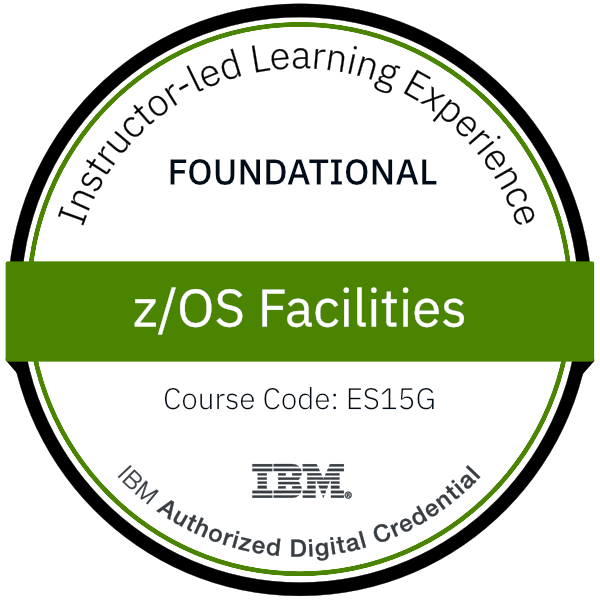title
Please take a moment to fill out this form. We will get back to you as soon as possible.
All fields marked with an asterisk (*) are mandatory.
z/OS Facilities
Course Description
Overview
This classroom course introduces the base elements, optional features, and servers that are provided in z/OS. It focuses on the system service facilities that are provided by the z/OS Base Control Program (BCP). It teaches the students the functions of major software base elements in the management of jobs, tasks, storage, data, and problems. It also addresses how these functions can be affected by the system programmer.
Students are introduced to the services provided by the servers which execute in the z/OS environments, such as the Communications Server and the Security Server. Installation packaging options and steps to install the z/OS environments also are introduced.
This course is one step in the following Learning Journeys:
Objectives
- Describe the system initialization process of the z/OS operating systems
- State the differences between an address space, data space, and hyperspace
- Describe the process of translating a virtual address to a real address
- Explain the difference between paging and swapping
- Define a z/OS task
- Describe dispatching, interrupt processing, supervisor calls, cross memory services, and serialization
- Describe the purpose of the Job Entry Subsystem (JES)
- Illustrate the flow of a job through the z/OS environment
- Describe the allocation process for data sets in the z/OS environments
- Illustrate how an I/O request is processed in a z/OS environment
- Describe how workload management is accomplished in a z/OS environment
- Explain the z/OS recovery processes and list available Problem Determination Tools
- Describe z/OS storage management concepts
- Describe the UNIX System Services functions provided in the z/OS environments
- Explain the network topologies and protocol support provided in z/OS
- Describe system security and network security for a z/OS environment
- Create a high-level plan for the installation and configuration of a z/OS environment
Audience
This class is designed for persons who are new to the z/OS platforms but have a technical background in information technology. It is intended for those who require an in-depth understanding of z/OS.
Prerequisites
You should have a basic knowledge of IS technologies and also should be familiar with z/OS concepts and how these systems support the Enterprise servers. This knowledge can be obtained by attending An Introduction to the z/OS Environment (ES050). Youd should also have practical experience with logging on to TSO and working with JCL. This experience can be obtained by attending z/OS Quick Start (ES10A)
Topics
Day 1
- Unit 1: z/OS overview
- Including welcome and course overview
- Unit 2: Storage management
Day 2
- Unit 3: Managing work
- Unit 4: Input/output processing
Day 3
- Unit 4: Input/output processing (continued)
- Unit 5: Data management
- Unit 6: Job management
Day 4
- Unit 7: IPL and system initialization
- Unit 8: Termination and recovery analysis
- Unit 9: Installing and configuring
Day 5
- Unit 10: Communicating
- Unit 11: Security in z/OS
- Including end-of-course summary
Recognition
When you complete the Instructor-Led version of this course, you will be eligible to earn a Training Badge that can be displayed on your website, business cards, and social media channels to demonstrate your mastery of the skills you learned here.
Learn more about our System Operators Badge Program →Related Courses
-
z/OS System Programmer Fundamentals
ES40G- Duration: 32 Hours
- Delivery Format: Classroom Training, Online Training
- Price: 3,580.00 USD
-
z/OS System Services Structure
ES20G- Duration: 36 Hours
- Delivery Format: Classroom Training, Online Training
- Price: 4,475.00 USD
Self-Paced Training Info
Learn at your own pace with anytime, anywhere training
- Same in-demand topics as instructor-led public and private classes.
- Standalone learning or supplemental reinforcement.
- e-Learning content varies by course and technology.
- View the Self-Paced version of this outline and what is included in the SPVC course.
- Learn more about e-Learning
Course Added To Shopping Cart
bla
bla
bla
bla
bla
bla
Self-Paced Training Terms & Conditions
Exam Terms & Conditions
Sorry, there are no classes that meet your criteria.
Please contact us to schedule a class.

STOP! Before You Leave
Save 0% on this course!
Take advantage of our online-only offer & save 0% on any course !
Promo Code skip0 will be applied to your registration
Purchase Information
title
Please take a moment to fill out this form. We will get back to you as soon as possible.
All fields marked with an asterisk (*) are mandatory.










